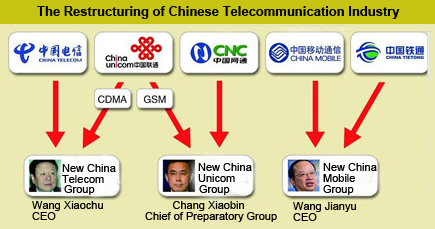

From Corporation Page 28, issue no. 369, May 26, 2008
Translated by Liu Peng
Original article: [Chinese]
The latest round of consolidation for the Chinese telecommunication industry has been finalized, streamlining five companies into three giants and appointing new chiefs.
The original China Mobile Group, China Unicom Group, China Telecom Group, China Netcom Group and China Tietong Group have become New China Mobile, headed by Wang Jianyu; New China Unicom, headed by Zhang Xiaobin; and New China Telecom, led by Wang Xiaochu.
The latest development was the fourth time the industry has been restructured since the telecommunication businesses were separated from the postal telecom office in 1998.
Intergration Scheme
On May 23 China's state-owned enterprise authority – State-owned Assets Supervision and Administration Commission (SASAC) – announced the integration scheme.
According to the scheme, China Mobile, the largest telecommunication service in China, would take over China Tietong Corporation to form the New China Mobile; but Tietong would maintain its independent operation.
Meanwhile, China Unicom, while ceding its CDMA network to China Telecom, would merge with China Netcom to become New China Unicom Corporation.
Prior to kick-starting the integration scheme, SASAC had already made up a list of top personnel appointments (see background below).
But some expressed disappointment over the scheme. Shu Huaying, professor of Beijing University of Post and Telecommunications, said it was only a reallocation of existing resources but failed to address imbalances in the market.
Integration Impact
Though the integration scheme would not involve the Hong Kong-listed company under China Mobile Corporation, its stock price still declined 3.8% on May 23 following the announcement.
It was an indication that investors expected the integration scheme would likely weaken China Mobile's competitiveness.
Wang Yuquan, general-manager of Frost & Sullivan (China), a market research and consulting company, said the scheme might reshape the competition structure.
He pointed out that China Telecom's concern would be developing its CDMA-network client base; while China Unicom was the weakest among three giants in terms of sales points, it had the most optimum business operation structure.
He also noted that though China Mobile had the strongest funding, its huge investment in TD-SCDMA project appeared to be less optimistic.
Industry expert Xiang Ligang believed China Mobile would draw up a comprehensive and long-term program on developing its fixed telecommunication networks.
He added China Telecom would march into the market in northern China region, initiating a new round of infrastructure construction, thus giving telecommunication equipment suppliers a shot in the arm.
The split in China Unicom's CDMA and GSM networks also became the focus of discussions among industry watchers.
With over 300 subsidiaries under its wings, China Unicom's CDMA and GSM networks shared various resources, including personnel, telecommunication stations, and wireless equipment.
An in-circle source estimated that to separate the core facilities of CDMA-network from the company would incur huge costs to restore the necessary setting.
When the formula for splitting the operations finalized, it would still need the endorsement of shareholders.
Meanwhile, China Telecom had been preparing to take over the CDMA network for some time, consulting experts and technical personnel for market research and mapping out future investment and market strategies.
Background: Top Personnel Adjustment Following the Consolidation
New China Mobile:
Wang Jianyu – CEO (post retained) and vice secretary of the Corporation's Communist Party of China (CPC) committee
Zhang Chunjiang – former CEO of China Netcom, now vice-president and secretary of the Corporation's CPC committee
The original vice presidents in China Mobile Corporation will retain their positions; three new vice presidents are Zhao Jibin, former board director of China Tietong; Zhang Xiaotie, former vice-president of China Netcom; and Li Zhengmao, former vice-presidentof China Unicom.
New China Telecom:
Wang Xiaochu – CEO (post retained)
Shang Bing – former president, now vice-president and secretary of the Corporation's CPC committee
The rest of the existing vice presidents retain their posts; while China Netcom's Yang Xiaowei, former vice-president, and Miao Jianhua, formerly of the party disciplinary inspection committee, would be absorbed into China Telecom.
New China Unicom:
The remaining top management personnel of China Unicom and China Netcom will form a preparatory group for the new corporation.
Chang Xiaobing (former chairman of board of directors of China Unicom) is the chief of the preparatory group
Other group members include Li Gang and Zhang Jun'an (both vice presidents of China Unicom), Lu Yimin (vice--secretary of the China Netcom's CPC committee) and other China Netcom's vice-presidents like Zuo Xunsheng, Pei Aihua, Zhao Jidong, Li Jianguo, Li Fushen and Jiang Zhengxin.

